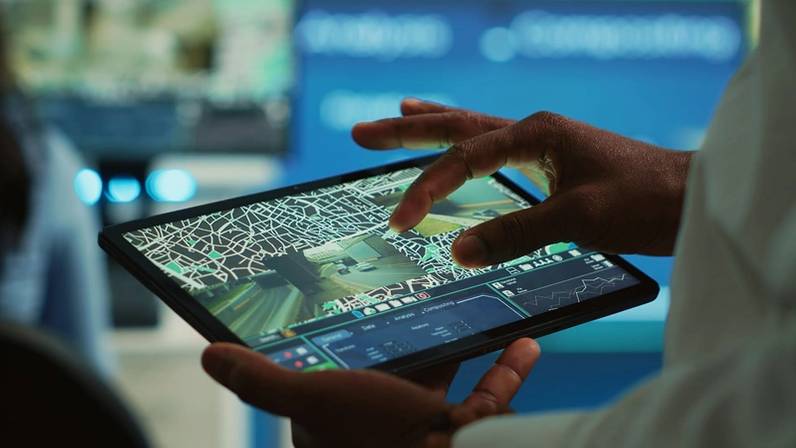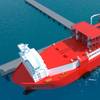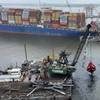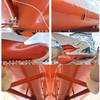Meet ‘Super GPS’: XONA Ups the Space Race Ante
With a mission to power the current and next-generation of GPS-enabled products and systems, XONA Space Systems keeps the mantra ‘precision, power and protection’ in all that it does as this 2020-start-up designs, builds and launches its fleet of low earth orbit satellites. We spoke with XONA CEO Brian Manning for his insights on how this could impact the maritime, offshore energy and subsea sectors.
The following was excerpted from Maritime Reporter TV’s interview with XONA CEO Brian Manning. Watch the full interview here:
To start … XONA Space Systems … when and why was it founded?
The founding team all met back at Stanford, Stanford Aerospace engineers that all [studied] together 10 years or so ago. A lot of the company has formed around the work of our CTO, Dr. Tyler Reid. After his PhD, Dr. Reid went to work at Ford in its autonomous driving group. A lot of the challenges that he was trying to solve there was what types of navigation, sensors, systems, et cetera, can support [autonomous driving]. What he was finding is that they were able to get these vehicles to work in certain environments, but when you take a $30,000 sedan and add $500,000 worth of sensors on top of it … not something that's scalable. [So he starts to look for a technology that is scalable, the use of technology not for a luxury item but something that is really making a difference in everyone's life]. At XONA, we are believers in the potential of modern technology, but also believe that for it to be able to scale you need to have the infrastructure available to support these things.
[Foundational for modern, autonomous products] to operate safely is knowing where they are to a very high degree of accuracy. GPS can generally tell you what road you're on, but that's not good enough when you need to know, ‘am I on the right side of the road’? That’s the system that we're building.
So can you give a ‘by the numbers’ look at XONA today?
If you look at some of the other incredibly impactful technologies in history; the iPhone with 2-3 billion iPhones sold; Facebook and 3 billion users – there are more than 5.5 billion people in the world that have access to the internet, and there's more than 6 billion active GPS devices. It's on a scale that very few, if any, technologies have ever gotten to. That's what gets us excited is that all of these are looking for better performance or would like to have better performance in different areas.
That's something that attracted me – and I think attracted a lot of the people we have here at XONA – the ability to make impact on a global scale. So we're about five years old. We're about 25 people. We just closed our latest funding round so we are growing and hiring. We launched our first satellite in 2022, and now we're on track to launch our next, the first production class one coming up next year. And then from there we'll be growing up and building up a system to get the full service up and active within the next few years.
 "GPS is amazing service, but it is a government service first, and that means the government gets the goodies. Civilians certainly get a service, but they don't get access to all the toys that the DOD side has. And one of those toys that the DOD has today is a protected service, one that's encrypted and authenticated," says Brian Manning, CEO, XONA
"GPS is amazing service, but it is a government service first, and that means the government gets the goodies. Civilians certainly get a service, but they don't get access to all the toys that the DOD side has. And one of those toys that the DOD has today is a protected service, one that's encrypted and authenticated," says Brian Manning, CEO, XONA
Photo copyright DC Studio/AdobeStock
When you say you're going to be full service, what does that look like?
We can start services with basic capabilities available in a few areas of the world with less than 20 satellites. The final system is about 250.
With this new satellite network, what exactly will XONA be offering?
The best way to think of it is Super GPS.
There are a couple big challenges that you can boil down into three major pain points: precision, power and protection. From a precision standpoint, it's going from something that is several meters down to several centimeters. The power and protection side are fairly closely tied that from a protection standpoint. GPS is amazing service, but it is a government service first, and that means the government gets the goodies. Civilians certainly get a service, but they don't get access to all the toys that the DOD side has. And one of those toys that the DOD has today is a protected service, one that's encrypted and authenticated.
Ours will be the first civilian available [GPS] service that has that encryption and protection layer, which is incredibly important, especially as you move into things that are not just safety critical, that it's human lives on the line, but also even just liability critical.
On the power side, power is tied to protection. There's a lot of jamming and spoofing, especially in the Black Sea areas around Russia right now. If you're in the middle of the open sea and all you’ve got is GPS and someone starts jamming it or sending out fake signals, it can put you in a pretty bad situation. Our signals are substantially stronger with some other protection characteristics built in to make them more resilient to interferences.















